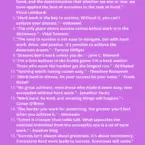

In today’s fast-paced world, it’s all too easy to get caught up in the constant chase for success, often forgetting the value of rolling up our sleeves and putting in the effort required to achieve our goals. The truth is, hard work is an essential ingredient to not only our professional success but also our personal growth and well-being.
In this comprehensive article, we will delve deep into the concept of ‘working hard,’ shedding light on its true meaning and debunking common misconceptions. We’ll explore the fascinating science behind hard work, its numerous benefits, and how it can even surpass natural talent in certain situations. Additionally, we’ll provide you with practical strategies for cultivating hard work in your own life and share inspiring examples of individuals who have achieved great success through their unwavering dedication and effort.
So, without further ado, let’s dive in and uncover the transformative power of hard work! Together, we’ll learn how to harness this incredible force to unleash our full potential and create the lives we’ve always dreamed of.
The Meaning of Hard Work
Understanding the true meaning of hard work is crucial for our journey towards personal and professional success. In this section, we’ll define hard work, debunk some common misconceptions, and examine the role of passion and motivation in our quest for greatness.
Defining Hard Work
At its core, hard work means consistently putting in the effort, time, and dedication required to achieve a specific goal or improve a particular skill. It’s about pushing ourselves beyond our comfort zones, staying disciplined, and persevering through obstacles and setbacks. Hard work is the ongoing commitment to striving for excellence, even when the going gets tough.
Common Misconceptions about Hard Work
Many people hold certain misconceptions about hard work, which can sometimes hinder their progress. Let’s clear up a few of these misunderstandings:
- Hard work means working non-stop: Working hard doesn’t mean neglecting your well-being by working around the clock. It’s about working smart, prioritizing tasks, and managing your time efficiently.
- Hard work guarantees success: While hard work can significantly increase your chances of success, there are no absolute guarantees. However, it’s important to remember that hard work helps build the skills, resilience, and determination necessary to navigate through challenges and bounce back from setbacks.
- Some people don’t need to work hard: We often hear stories of individuals who seem to achieve success effortlessly. However, the reality is that behind every great achievement, there is usually a hidden story of hard work, persistence, and sacrifice.
The Role of Passion and Motivation
Passion and motivation are essential factors that fuel our hard work. When we’re passionate about something, we’re more likely to invest the time and effort required to excel in that area. Similarly, having a strong motivation, such as a personal goal or a sense of purpose, can provide us with the necessary drive to work hard and push through challenges.
In summary, the meaning of hard work is much more than just putting in long hours or toiling away at tasks. It’s about being dedicated, disciplined, and persistent in our efforts to achieve our goals and grow as individuals. By recognizing the importance of passion and motivation, we can tap into our inner drive and unleash the full potential of hard work in our lives.
The Science Behind Hard Work
As we continue to explore the power of hard work, it’s essential to understand the science that supports its transformative effects on our personal and professional lives. In this section, we’ll delve into the growth mindset, the role of grit and resilience, and how our brains adapt to challenges.
The Growth Mindset and Its Connection to Hard Work
The concept of a growth mindset, coined by psychologist Carol Dweck, is a crucial component of hard work. A growth mindset is the belief that our abilities, intelligence, and talents can be developed through dedication, effort, and learning. Embracing a growth mindset encourages us to work harder, view challenges as opportunities, and persevere through setbacks.
Individuals with a growth mindset understand that success is not solely determined by innate talent but by the effort they put into cultivating their skills. This mindset fuels hard work and helps us maintain motivation, even when faced with obstacles.
The Role of Grit and Resilience
Grit, a term popularized by psychologist Angela Duckworth, is the combination of passion and perseverance for long-term goals. Grit is an essential quality that enables individuals to work hard consistently, despite setbacks and failures. Resilience, on the other hand, is our ability to bounce back from challenges and adversity. Together, grit and resilience empower us to stay committed to our goals and maintain the hard work necessary to achieve them.
Research has shown that grit and resilience play a significant role in predicting success across various domains, from academics to professional settings. By cultivating these qualities, we can unlock our potential and enhance our ability to work hard and achieve our goals.
How the Brain Adapts to Challenges
The human brain is a remarkable organ that is continuously evolving and adapting in response to our experiences. When we work hard, particularly when faced with challenges, our brain undergoes a process called neuroplasticity. Neuroplasticity is the brain’s ability to rewire and create new neural connections, allowing us to learn, adapt, and grow.
As we persevere through difficult tasks and continue to work hard, our brain becomes more efficient at processing information and solving problems. This adaptation not only enhances our cognitive abilities but also reinforces the importance of hard work in personal and professional growth.
The science behind hard work highlights the importance of embracing a growth mindset, cultivating grit and resilience, and acknowledging the brain’s incredible capacity for adaptation. By understanding and harnessing these scientific concepts, we can further unlock the power of hard work and continue on our path towards success and personal growth.
The Benefits of Hard Work
Now that we have a solid understanding of the meaning and science behind hard work, let’s dive into the numerous benefits it offers. From personal growth and psychological rewards to professional success and skill development, the advantages of hard work are truly multifaceted.
The Personal and Psychological Benefits
Developing Self-Discipline
Hard work requires a high degree of self-discipline to stay committed, focused, and consistent in our efforts. As we work hard, we gradually strengthen our self-discipline, which then positively impacts other areas of our lives. Self-discipline allows us to maintain healthy habits, achieve long-term goals, and make better decisions.
Building Self-Confidence
As we work hard and start seeing the results of our efforts, our self-confidence grows. We begin to trust our abilities, and our belief in ourselves strengthens. This self-confidence can have a profound impact on various aspects of our lives, including our relationships, career choices, and overall well-being.
Overcoming Obstacles
Working hard helps us develop the skills and mental resilience required to face and overcome obstacles. As we push through challenges, we learn valuable lessons, refine our problem-solving abilities, and become more adaptable to change.
The Professional Benefits
Career Advancement
Hard work is often recognized and rewarded in professional settings. By consistently demonstrating a strong work ethic, dedication, and commitment, we are more likely to be considered for promotions, receive positive evaluations, and garner the respect of our colleagues and superiors.
Skill Development
When we work hard, we’re not only investing time and effort into our tasks but also expanding our skills and knowledge. As we learn and grow, we become more valuable in the workplace, leading to greater job security, increased responsibilities, and the potential for higher earnings.
Increased Productivity
Working hard enables us to enhance our productivity, leading to a more efficient use of time and resources. As we hone our skills and work smarter, we can achieve more in less time, contributing to both personal and organizational success.
The benefits of hard work are vast, spanning personal growth, psychological well-being, and professional success. By embracing hard work, we can develop self-discipline, boost self-confidence, overcome obstacles, advance our careers, and cultivate valuable skills. As we continue to work hard and enjoy the rewards of our efforts, we pave the way for a fulfilling and prosperous life.
Hard Work vs. Talent
The age-old debate of hard work versus talent often sparks lively discussions about which holds more weight in the pursuit of success. In this section, we’ll explore this great debate, consider whether hard work can surpass natural talent, and discuss the importance of hard work in cultivating talent.
The Great Debate: Hard Work vs. Talent
Talent refers to the natural abilities and aptitudes that individuals possess, which may give them an edge in certain areas or activities. On the other hand, hard work is the effort and dedication one puts into achieving a goal or developing a skill. While both talent and hard work play a role in success, their significance varies depending on the context, individual, and goals in question.
Can Hard Work Surpass Natural Talent?
Although talent can provide a head start, it’s not always a guarantee of long-term success. In many instances, hard work can indeed surpass natural talent. When individuals put in the time and effort to develop their skills, they can overcome initial skill gaps and, in some cases, even outperform those with innate talents.
Research has shown that individuals who work hard and persevere tend to achieve greater success than those who solely rely on their talents. This is because hard work helps build discipline, resilience, and adaptability, which are crucial traits for navigating the ever-changing landscape of personal and professional challenges.
The Importance of Hard Work in Cultivating Talent
Talent alone is not enough to guarantee success. Hard work plays a crucial role in honing and expanding our natural abilities. By consistently putting in the effort to learn, grow, and refine our skills, we can maximize our potential and make the most of our talents.
It’s also important to note that talent and hard work are not mutually exclusive. A combination of both can lead to extraordinary achievements. Those who are both talented and dedicated to working hard have the potential to reach remarkable heights in their personal and professional lives.
The debate between hard work and talent is complex and multifaceted. While natural talent can provide initial advantages, it’s the hard work, dedication, and perseverance that ultimately drive long-term success. By embracing hard work and using it to cultivate our talents, we can unlock our true potential and achieve greatness in our chosen fields.
Strategies for Cultivating Hard Work
As we’ve learned, hard work is an essential ingredient for personal growth, professional success, and overall well-being. With that in mind, let’s explore some practical strategies to help cultivate hard work and make the most of its transformative power.
Setting SMART Goals
Setting clear, attainable goals is vital for channeling our hard work in the right direction. To ensure our goals are effective, we can use the SMART criteria, which stands for Specific, Measurable, Achievable, Relevant, and Time-bound. By setting SMART goals, we can focus our efforts, track our progress, and stay motivated throughout the journey.
Embracing Failure as a Learning Opportunity
Failure is an inevitable part of life, and learning to embrace it can significantly enhance our ability to work hard. When we view failure as an opportunity to learn and grow, we’re more likely to persevere and continue putting in the effort, despite setbacks. By adopting a growth mindset and treating challenges as learning experiences, we can build resilience and stay committed to our goals.
Implementing Effective Time-Management Techniques
Effective time management is crucial for maximizing productivity and making the most of our hard work. By implementing techniques such as prioritizing tasks, breaking goals into smaller milestones, and eliminating distractions, we can work more efficiently and make steady progress towards our objectives.
Surrounding Yourself with Like-Minded Individuals
The company we keep can have a significant impact on our work ethic and dedication. Surrounding ourselves with like-minded individuals who share our passion and commitment to hard work can provide motivation, support, and inspiration. By fostering connections with those who share our values, we can create a positive environment that nurtures hard work and perseverance.
Cultivating hard work involves setting SMART goals, embracing failure as a learning opportunity, implementing effective time-management techniques, and surrounding ourselves with supportive, like-minded individuals. By incorporating these strategies into our daily lives, we can strengthen our work ethic and stay focused on our goals.
Balancing Hard Work and Well-being
While hard work is essential for personal growth and professional success, it’s important to remember that maintaining our overall well-being is equally vital. Striking the right balance between hard work and self-care is key to sustaining our efforts and avoiding burnout. In this section, we’ll explore some practical tips for balancing hard work with our physical, emotional, and mental well-being.
Prioritizing Self-Care
Self-care involves taking the time to nurture and nourish ourselves in order to maintain our overall well-being. By regularly engaging in activities that promote relaxation, self-reflection, and emotional rejuvenation, we can recharge our batteries and prevent burnout. Some self-care practices may include meditation, exercise, spending time in nature, or pursuing a hobby.
Setting Boundaries
To maintain a healthy balance between hard work and well-being, it’s crucial to set boundaries. This may involve establishing dedicated work hours, limiting work-related communication during personal time, and learning to say no to tasks or commitments that may compromise our well-being. By setting clear boundaries, we can protect our mental, emotional, and physical health while still dedicating ourselves to our goals.
Practicing Mindfulness
Mindfulness is the practice of being present and fully engaged in the current moment. By incorporating mindfulness into our daily routines, we can become more aware of our thoughts, emotions, and bodily sensations, enabling us to identify when we need to pause, rest, or refocus our efforts. Mindfulness techniques, such as deep breathing exercises, guided imagery, or progressive muscle relaxation, can help us stay in tune with our well-being and maintain a healthy balance between work and self-care.
Seeking Support
Having a strong support network is essential for maintaining our well-being as we work hard towards our goals. Friends, family members, colleagues, or mentors can provide emotional support, encouragement, and guidance when we’re feeling overwhelmed or facing challenges. Don’t hesitate to reach out to your support network when you need a listening ear or a helping hand.
Balancing hard work and well-being is crucial for maintaining our physical, emotional, and mental health while pursuing our goals. By prioritizing self-care, setting boundaries, practicing mindfulness, and seeking support, we can create a sustainable approach to working hard that fosters both personal growth and overall well-being.
Inspiring Examples of Hard Work
Throughout history, countless individuals have demonstrated the power of hard work in achieving remarkable success, overcoming adversity, and making significant contributions to society. In this section, we’ll highlight a few inspiring examples of hard work that can serve as motivation and encouragement for us all.
Thomas Edison
Thomas Edison, one of the most prolific inventors in history, is an outstanding example of hard work and perseverance. He held over 1,000 patents and was responsible for groundbreaking inventions such as the phonograph, the motion picture camera, and the electric light bulb. Edison famously stated, “Genius is one percent inspiration and ninety-nine percent perspiration.” His dedication and relentless work ethic serve as an inspiration for generations to come.
Oprah Winfrey
Oprah Winfrey’s journey from humble beginnings to becoming a media mogul and philanthropist is a testament to the power of hard work. Despite facing significant challenges and setbacks throughout her life, Oprah persevered and became one of the most influential and successful women in the world. Her unwavering dedication to her goals and her commitment to helping others are truly inspiring.
J.K. Rowling
J.K. Rowling, the author of the world-renowned Harry Potter series, faced numerous obstacles before achieving literary success. Struggling as a single mother and living in relative poverty, Rowling continued to work tirelessly on her manuscript, even after facing multiple rejections from publishers. Her perseverance and dedication to her craft eventually led to the creation of one of the most beloved book series and a global phenomenon.
Michael Jordan
Widely regarded as one of the greatest basketball players of all time, Michael Jordan’s success can be attributed to his incredible work ethic and unwavering determination. Despite being cut from his high school basketball team, Jordan used this setback as motivation to work even harder. He once said, “I’ve missed more than 9,000 shots in my career. I’ve lost almost 300 games. Twenty-six times, I’ve been trusted to take the game-winning shot and missed. I’ve failed over and over and over again in my life. And that is why I succeed.” Jordan’s relentless pursuit of greatness exemplifies the power of hard work in achieving success.
These inspiring examples of hard work serve as powerful reminders that with dedication, perseverance, and resilience, we too can overcome obstacles, achieve our goals, and make a difference in the world.
Conclusion
As we bring our exploration of hard work to a close, it’s important to remember that the journey to personal and professional success is paved with dedication, effort, and perseverance. The power of hard work lies in its ability to foster personal growth, cultivate resilience, and unlock our full potential.
Throughout this article, we’ve delved into the meaning and science behind hard work, discussed its benefits, and examined the balance between hard work and well-being. We’ve also considered the great debate between hard work and talent, and shared inspiring examples of individuals who have achieved remarkable success through their unwavering dedication.
By incorporating the strategies outlined in this article, such as setting SMART goals, embracing failure as a learning opportunity, and prioritizing self-care, we can harness the transformative power of hard work and create a fulfilling, prosperous life.
Remember, the road to success is not always smooth, but with hard work, determination, and a growth mindset, we can navigate the challenges that come our way and achieve greatness in our chosen fields. Keep pushing forward, stay dedicated to your goals, and let the power of hard work guide you towards a brighter future.
Frequently Asked Questions
In this section, we’ve compiled a list of frequently asked questions related to hard work, providing succinct and informative answers to help clarify common queries and misconceptions.
Q: Is hard work more important than talent?
A: While both hard work and talent play a role in success, hard work is often considered more important in the long run. Talent can provide a head start, but without hard work and dedication, it may not be enough to achieve sustained success. By putting in the effort to learn, grow, and refine skills, individuals can maximize their potential and even surpass those with innate talents.
Q: Can hard work lead to burnout?
A: Yes, excessive hard work without proper self-care and balance can lead to burnout. It’s important to strike a balance between hard work and well-being by prioritizing self-care, setting boundaries, practicing mindfulness, and seeking support when needed.
Q: How can I stay motivated to work hard?
A: Staying motivated to work hard can be achieved by setting clear, attainable goals, celebrating small wins, surrounding yourself with like-minded individuals, maintaining a positive attitude, and focusing on the reasons behind your efforts. Remember that motivation can fluctuate, and it’s essential to develop self-discipline and resilience to keep working hard, even during challenging times.
Q: Is it possible to work too hard?
A: Yes, it is possible to work too hard. Overworking can negatively impact our physical, emotional, and mental well-being. It’s crucial to recognize when we need to rest, recharge, and take breaks to maintain a healthy balance between hard work and self-care.
Q: How do I know if I’m working hard enough?
A: Determining whether you’re working hard enough depends on your personal goals, values, and priorities. Regularly reviewing your progress, reflecting on your efforts, and evaluating the outcomes of your hard work can help you assess whether you’re putting in the necessary effort to achieve your objectives. If you’re consistently making progress towards your goals and feel challenged yet fulfilled, it’s a good indication that you’re working hard enough.
Remember, hard work is a personal journey, and each individual’s definition of “working hard enough” may vary. What’s most important is staying committed to your goals, learning from your experiences, and striving for continuous growth and improvement.
















